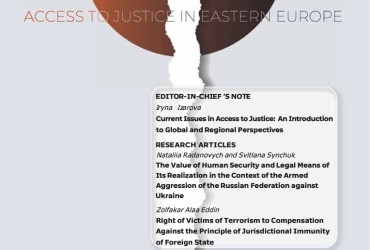
Open Access Journals

We are pleased to present the first issue of Access to Justice in Eastern Europe for 2026 (1/2026). This issue reflects our commitment to international scholarly exchange, bringing together research from authors in Bulgaria, Kazakhstan, Latvia, Lithuania, Romania, Saudi Arabia, the United Arab Emirates, and Ukraine. In an era of rapid innovation and persistent conflict, this edition analyzes the transformation of legal systems through the lenses of human dignity and the rule of law.
Issue Highlights:
In the article "Transitional Justice Mechanisms and Societal Reconciliation for Rule of Law and Democracy Consolidation in Post-Communist Romania. Jurisprudential Perspectives on Reparatory Rights, Lustration and Regime of Property," Anca Parmena Olimid, Cătălina Maria Georgescu, and Cosmin Lucian Gherghe analyze Romania's 35-year journey since the 1989 Revolution. The study offers a vital framework for understanding how societies in transition can develop a legal culture focused on human rights and the consolidation of the rule of law.
"Post-Mortem Justice: Human Dignity and Legal Protections in the European Union" by Andreea-Nicoleta Dragomir and her co-authors examines the complex issue of whether human dignity has justiciable implications beyond death. Using Ukraine as a poignant case study, the authors analyze the challenges of digitalized warfare and advocate for a systematized framework to protect the rights of the deceased in the digital age.
Iva Pushkarova’s research, "Procedurally Relevant Vulnerabilities of Children in Criminal Proceedings: Adapted and Child-Sensitive Procedural Models,"develops a functional typology of vulnerabilities affecting children in legal processes. Complementing this, Jamal Barafi and colleagues present a comparative study, "The Child's Right to Be Heard During Administrative and Judicial Proceedings," highlighting the need for clear mechanisms to ensure the child's voice is truly considered in legal outcomes across Finland, France, and Belgium.
Ramunė Jakštienė in "Digitally Tracked Victims and Abusers: Lithuanian Case Law on Technology-Facilitated Partner Stalking" explores Lithuanian case law regarding "tech stalking". The author identifies deficiencies in current legislation and calls for increased digital literacy among legal professionals and expanded responsibilities for developers.
The cover of this issue deserves special mention; through the imagery of a "vigilant eye" and the figure of Lady Justice, it symbolizes the continuity of fundamental legal principles within a new digital and data-driven reality.
We would like to express our sincere gratitude to our editorial team and reviewers for their exceptional professionalism, which ensures the high quality of our publications.
We invite our readers to explore these timely contributions and join the global dialogue on the future of justice!.
Our Archive:
The Special Issue of 2022 related to the war in Ukraine
The whole our archive is here: All Issues
Інформація про видання українською мовою на цій сторінці
We are exclusively receiving submissions through Scholastica. We welcome various article types related to access to justice and legal science, all of which undergo rigorous peer review and are evaluated without any editorial prejudices.
partly consisting of young academics’ essays;
with overview of current judgments important for law enforcement;
Why Europe Should Reconsider its Anti-Arbitration Policy in Investment Disputes
Extraordinary Complaint in Civil Proceedings under Polish Law
Small Claims and Procedural Simplification: Evidence from Selected EU Legal Systems

AJEE is proud to announce a new publication track. In collaboration with Prof. Michele Angelo Lupoi, we invite PhD students and early-career researchers to submit original papers on European civil procedure and transnational dispute resolution.

We are delighted to announce that our publisher, Academic Insight Press, is now an official member of the Austrian Booksellers and Publishers Association (HVB)!

New AJEE Issue 3/2025